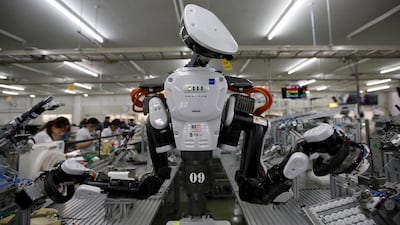The coronavirus pandemic has accelerated workforce changes faster than expected with the majority of employers predicted to divide work equally between humans and machines by 2025, according to a new report.
Robots and automation will displace 87 million jobs in the next five years while creating 97 million new employment opportunities, the World Economic Forum's Future of Jobs found.
“Covid-19 has accelerated the arrival of the future of work,” said Saadia Zahidi, managing director of the World Economic Forum.
She warned that "the window of opportunity for proactive management of this change is closing fast".
The pandemic has plunged the global economy into the worst recession since the Great Depression.
In the US, the world's biggest economy, it took a decade following the financial crisis to create 23 million new jobs. The coronavirus pandemic took just a month to destroy almost as many jobs, according to statistics from the Labour Department.
In the absence of proactive measures from governments and the private sector, the forum predicted that inequality is likely to be exacerbated by the dual impact of technology and the pandemic-induced recession.
“The pandemic has disproportionately impacted millions of low-skilled workers,” said Jeff Maggioncalda, chief executive of Coursera, one of the world's biggest online learning platforms that has been monitoring re-skilling demand among its students.
Half of employers are expecting to accelerate the automation of some roles in their companies, according to the report, which is based on a survey of senior leaders at nearly 300 global companies that collectively employ 8 million workers.
Demand for roles in areas such as data entry, accounting and administrative support are expected to suffer most.
For those workers set to remain in their roles in the next five years, nearly half will need re-skilling for their core skills.
Nearly 48 per cent of companies surveyed in the UAE were looking to accelerate automation, slightly below the global average, the study found.
“In the future, we will see the most competitive businesses are the ones that have invested heavily in their human capital – the skills and competencies of their employees,” Ms Zahidi said.
The tasks where humans are set to retain their comparative advantage include managing, decision-making, reasoning, communicating and interacting.
Demand for workers who can fill green economy jobs, as well as roles in the data and artificial intelligence economy, engineering, cloud computing and product development are set to surge, according to the survey.
The majority of employers, 84 per cent, said they are set to rapidly digitalise working processes, including a significant expansion of remote working.
Three-quarters of business leaders expect some negative impact on worker productivity, suggesting some are still struggling with the pandemic-induced shift to remote working .
The WEF's research also indicated that a growing number of people are making career changes to entirely new occupations.
According to LinkedIn data gathered over the past five years, half of career shifts into data and artificial intelligence are from different fields. That figure is much higher for sales roles (75 per cent), content creation and production positions, such as social media managers and content writers (72 per cent) and engineering roles (67 per cent).
Karin Kimbrough, chief economist at LinkedIn, said that directing workforce funding toward skills that have a larger impact on opening up longer term career paths "can make a real difference in addressing the unprecedented levels of unemployment that we're seeing globally".


